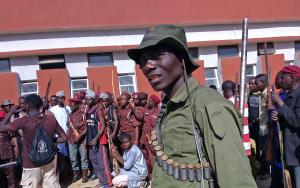Area Waya
This what you get in a society where government doesn't make deliberate efforts to rescue the vulnerable. 24yrs old Sherifat Bakare, is a young lady one could describe at first glance as pretty. But as she sat on the ground in front of the Special Anti-Robbery Squad of the Ogun State Police Command in Abeokuta, one cannot but imagine how deadly she might have been on operations with her robbery gang.
“I was hustling before Raji, my boyfriend, told me to join his gang,” Bakare began. But When she was asked to elaborate on what she did as a “hustler,” she explained that she meant prostitution.
“The gang asked me to sit in the front of the vehicle so that when we were stopped by policemen on the way, being a woman in the front seat would make them unsuspicious. But during the operation, the police cornered us and Raji was shot dead.”
Bakare in company with four other members of her gang, were apprehended on Wednesday, May 21, 2014 by the men of Ogun State SARS, who had been on their trail after receiving a tip-off about the gang’s plan.
It all began a few weeks ago, Bakare narrated. She said another member of the gang, Bola Onasile, (also in SARS custody) had approached her boyfriend about the availability of N70m in a wealthy man’s house in Joju area of Sango, Ogun State.
“I have only gone on two operations with them. I don’t know him (Onasile) well. I only know that he was the one who brought the job.
“Raji gathered other members and they snatched a vehicle (a Nissan Quest) around Iwo Road, Ibadan. We decided that the vehicle would be used for the operation."
Bakare did not betray any emotions as she narrated how the operation went.
Asked if she smoked Indian hemp like other members of her gang, she said, “I have never tasted it, I only smoke cigarette.”
But when our correspondent asked about her parents, tears streamed down her face.
“I am from Idofian in Kwara State. My father is late but my mother lives in Ibadan. She has no idea I do this kind of job and she does not even know I am in police custody.”
Bakare explained that she was a prostitute in Lekki where she was making up to N5,000 per day until about two years ago.
“I was living with a security guard in a house at Osborne in Ikoyi. The landlord of the house was out of the country. I was going from there to ‘hustle’ in Lekki every night.
“Raji was a good helper to me. That was why I decided to leave prostitution when he begged me. When he introduced me to armed robbery, I asked him if there would be no problem and he assured me that there would be none. When we started dating, I did not know he was an armed robber though.”
Asked how much she was promised out of the N70m they were going to steal, Bakare said whatever went to her late boyfriend would have accrued to her as well.
The young lady said she learnt photography when she dropped out of secondary school but had not been able to practise the trade because she did not think she could make much money from it.
During Punch’s visit to the SARS office in Abeokuta, 36-year-old Onasile, who brought the N70m job, was in a way evasive when asked how he knew about the money. He later said that an acquaintance of his, a man named Tunde, informed him about the money.
Onasile said, “Tunde is like a brother to me. He told me the man we were going to rob was his relation. He said the man had N70m at home. I told him I had no boys who could do the job. But he was always disturbing me about getting a gang together to do the operation.
“Few days later, I informed Raji about the operation and he told me he could get boys for the job. We planned to sell the vehicle we snatched after the operation but we did not know how police got to know about the operation. Tunde ran away when the police were after us.”
Onasile said he was a revenue collector for a local government council in Lagos before he lost the job when a new chairman weeded out excess employees from the council.


